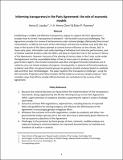| dc.contributor.author | Jacoby, Henry D. | |
| dc.contributor.author | Chen, Y.-H. Henry | |
| dc.contributor.author | Flannery, Brian P. | |
| dc.contributor.author | Jacoby, Henry D | |
| dc.date.accessioned | 2017-09-20T15:26:49Z | |
| dc.date.available | 2017-09-20T15:26:49Z | |
| dc.date.issued | 2017-08 | |
| dc.identifier.issn | 1469-3062 | |
| dc.identifier.issn | 1752-7457 | |
| dc.identifier.uri | http://hdl.handle.net/1721.1/111608 | |
| dc.description.abstract | Establishing a credible and effective transparency regime to support the Paris Agreement – broader than its formal ‘transparency framework’ – will be both crucial and challenging. The Agreement provides for review of achievements under national pledges (Nationally Determined Contributions, or NDCs), but much of this information will become available only well after key steps in the launch of this latest attempt to control human influence on the climate. Still, in these early years, information and understanding of individual and collective performance, and of relative national burdens under the NDCs, will play an important role in the success or failure of the Agreement. However, because of the phasing of various steps in the 5-year cycles under the Agreement and the unavoidable delays of two or more years to produce and review government reports, the Climate Convention and other intergovernmental institutions are ill-suited to carry out timely analyses of progress. Consequently, in advance of formal procedures, academic and other non-governmental groups are going to provide analyses based on available data and their own methodologies. The article explores this transparency challenge – using the MIT Economic Projection and Policy Analysis (EPPA) model to construct sample analyses – and considers ways that efforts outside official channels can contribute to the success of the Agreement. | en_US |
| dc.language.iso | en_US | |
| dc.publisher | Taylor & Francis | en_US |
| dc.relation.isversionof | http://dx.doi.org/10.1080/14693062.2017.1357528 | en_US |
| dc.rights | Creative Commons Attribution-Noncommercial-Share Alike | en_US |
| dc.rights.uri | http://creativecommons.org/licenses/by-nc-sa/4.0/ | en_US |
| dc.source | Jacoby | en_US |
| dc.title | Informing transparency in the Paris Agreement: the role of economic models | en_US |
| dc.type | Article | en_US |
| dc.identifier.citation | Jacoby, Henry D. et al. “Informing Transparency in the Paris Agreement: The Role of Economic Models.” Climate Policy 17, 7 (August 2017): 873–890 © 2017 Informa UK Limited, trading as Taylor & Francis Group | en_US |
| dc.contributor.department | Massachusetts Institute of Technology. Joint Program on the Science & Policy of Global Change | en_US |
| dc.contributor.department | Sloan School of Management | en_US |
| dc.contributor.approver | Jacoby, Henry D. | en_US |
| dc.contributor.mitauthor | Jacoby, Henry D | |
| dc.contributor.mitauthor | Chen, Y.-H. Henry | |
| dc.relation.journal | Climate Policy | en_US |
| dc.type.uri | http://purl.org/eprint/type/JournalArticle | en_US |
| eprint.status | http://purl.org/eprint/status/PeerReviewed | en_US |
| dspace.orderedauthors | Jacoby, Henry D.; Chen, Y.-H. Henry; Flannery, Brian P. | en_US |
| dspace.embargo.terms | N | en_US |
| dc.identifier.orcid | https://orcid.org/0000-0003-1897-1270 | |
| mit.license | OPEN_ACCESS_POLICY | en_US |
| mit.metadata.status | Complete | |
